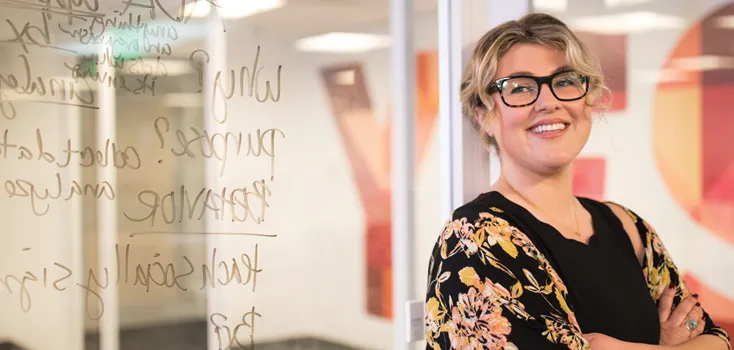What Is An Mfa In Writing

In "The Program Era: Postwar Fiction and the Rise of Creative Writing," Dr. Mark McGurl, calls the MFA the single biggest influence on American literature since World War II. Many serious writers arrive at their careers via the MFA. You may have heard about this degree, and you know it has to do with creativity at a high level, but you might still be wondering: "Just what is an MFA program? What does it offer? Is it only for aspiring novelists? How can I benefit from earning an MFA degree?"
From the beginning of human existence, the most powerful communication tool has been storytelling. Whether used to pass information down from generation to generation,to explain the unexplainable, or to transport us through space and time, stories connect us. As human beings, we are hardwired for stories. They "change our attitudes, beliefs, and behaviors." And those who can tell the best stories are the ones who will be the movers and the shakers of the 21st century. Training these storytellers — who communicate through creative writing, screenwriting, cinema, etc. — is what the National University MFA program does every day.
Master of Fine Arts vs. Master of Arts

So, what is an MFA — Master of Fine Arts — program? And how is it different from an MA — Master of Arts — program? Put simply, an MFA program is skills-based and focuses on a single area of study such as creative writing, screenwriting, theater, dance or digital cinema production. It's ideal for students who want to hone their skills in the creative and performing arts. An MA program is somewhat broader regarding the topics it covers, going beyond the creative arts. Additionally, while an MA program takes a more scholarly approach to teaching and learning, an MFA program typically takes a more practical approach. In an MFA program, you really learn by doing.
"Another differentiator of an MFA program is that the degree earned is what's called a 'terminal degree'," says Dr. Michael McAnear, department head for Arts and Humanities at National University. "What that means is that a Master of Fine Arts degree is the highest degree one can obtain in this field of study. So, for example, those who earn an MFA degree would be eligible to teach at the community college level." For many MA degree holders, a PhD in their field of study is considered the highest degree obtainable—requiring additional years of study.
Who's Getting an MFA Degree?
Because of the inherently creative nature of a Master of Fine Arts program, those who are looking for opportunities to expand their skills in writing, visual arts, digital production, screenwriting, and other artistic pursuits often find that an MFA program is a good fit for them. It provides an opportunity to be mentored by professionals who are active in the creative arts and it also offers a structured environment in which students can collaborate with and learn from their peers.
"Many of our MFA students are high school teachers," explains McAnear. "By getting an advanced degree, they can qualify for an increase in salary." There are also students in the program from many other career fields.
In addition to learning more about their area of interest and developing their skills, another reason many students enter an MFA program is to make connections. For example, in an MFA in Creative Writing program, students might be looking for ways to attract the attention of publishers. Those in a program focused on screenwriting might be focused on developing a network of contacts within the film industry. Regardless of the specific field of study, an MFA program in which you're surrounded by active, creative professionals and like-minded peers provides unique opportunities not only to expand your knowledge,but also to expand your network.
Should You Get an MFA Degree?
The answer to that question is something only you can determine. As with any other graduate program, you first need to determine why you want the degree. Like the high school teachers mentioned by McAnear, are you hoping to see an increase in salary? Or are you focused on preparing a body of work that will help you gain access to influencers in your area of interest? Or are you looking for a way to feed your desire to improve your writing or artistic skills for the pure joy of it?
In a 2015 New York Times article titled "Why Writers Love to Hate the MFA," literary critic Anis Shivani described "To MFA or not to MFA?" as a "deadly question." He went on to say:
"'Everyone who wants to be a writer in this country has to confront it, even if you rebel against the MFA,' he says. 'If you do the degree, opportunities open up.' Without it, he warns, you may be able to publish in small presses but are more likely to be 'condemned to obscurity,' particularly if you write literary fiction and poetry. And your writing will change, he says, and not necessarily for the better."
Although Shivani's comments applied to Master of Fine Arts programs focused on creative writing, the point he made about new opportunities being made available to those who earn the degree is also one that characterizes MFA programs focused on other areas of study.
So, should you get a Master of Fine Arts degree? There's no right or wrong answer. There's only your answer.

Getting a Master of Fine Arts Degree at National University
"Many of the MFA students at National University are juggling the demands of work life and family life," says McAnear. "So, fitting a college curriculum into their very busy lives can be quite a challenge." With this in mind, National University designed an MFA degree program that's delivered online. This allows students a greater level of flexibility when it comes to when and where they complete their coursework.
The MFA program at National University offers three distinct tracks. Each of the tracks within the program has a curriculum specifically designed to help students gain and expand the skills needed to perform at the highest level. Here is a sampling of what students enrolled in the MFA online program are learning:
-
- MFA of Fine Arts in Creative Writing
Students develop the skills necessary for creating powerful narratives for works of fiction, poetry, and nonfiction. Instruction focuses on a wide range of topics, including plot and character development, theme exploration, and writing structure/style. Students prepare for a career in writing, publishing, or filmmaking, or to teach writing at the college or university level. (This program is taught completely online. No on-site residency is required.) - MFA of Fine Arts in Professional Screenwriting
Helping students gain a thorough understanding of plot, character and dialogue development for screenplays is the goal of this program. Additionally, emphasis is placed on screenplay adaptation, script evaluation, and entertainment industry marketing. Students write professional-level scripts and learn how to present their work to the entertainment industry. (A two-week, on-site residency in Los Angeles is required for this track.) - MFA of Fine Arts in Digital Cinema Production
Employing a comprehensive approach to teaching applied cinematic arts, the digital cinema production program prepares students to enter and succeed in the world of film production and editing. A broad array of topics are addressed, including cinematic design, short film forms, sound design, cinematography, film editing, and post-production workflow. Students learn to produce professional media projects and prepare to teach film and media arts programs at the college and university level. (Three residency workshops must be taken on-site at the National University Los Angeles campus.)
- MFA of Fine Arts in Creative Writing
Students choose which track they want to pursue and then embark on an accelerated path to earning their MFA degree. They take one course at a time, with elective courses lasting one month and workshops lasting two months. It's possible for students to complete the MFA in Creative Writing degree program in as little as 20 months.
Learning from a Faculty of Award-Winning Creative Professionals
Learning from a professional is one of the most effective ways to acquire and perfect any new skill. One of the most valuable benefits of getting an MFA degree online with National University is being taught by a faculty comprised of individuals who have achieved significant success in their respective fields. The full-time faculty teaching in National University's MFA program is quite accomplished. "They include published authors, poets, award-winning documentary filmmakers, magazine writers and so many more," says McAnear. "Also, we have adjunct faculty who bring their own professional expertise to the classroom."
Bringing the On-Campus Student Experience to the Online Classroom
One common question about online education is: Do students miss out on the benefits of being in a classroom environment on campus? According to McAnear, the interactive structure of the program helps keep students engaged, just as they would be in a traditional classroom. For example, students participate in discussion forums where they respond to questions or ideas posed by the instructor. Then, they can also reply to what their classmates are saying. This replicates the types of spirited discussions that take place among students who attend classes on campus. Students also work on assignments that provide valuable opportunities to improve existing skills and learn new ones.
"In addition to receiving feedback from their instructors, students are also sharing ideas with their peers in the course," explained McAnear. "We have small classes, typically with 15-20 students, and we're all learning together. Very powerful comraderies are formed." The result is that there is a great deal of collaboration among the students themselves, as well as with the instructors. "At the end of the day," says McAnear, "we're all trying to perfect our craft."

Through video conferencing technology, instructors and students can communicate face-to-face during office hours or at other times as needed. Also, guest speakers from various creative fields are brought into the online experience. This provides opportunities for students to hear about and learn from the real-life experiences of these successful professionals. Past guest speakers and content creators who have spent time with National University MFA students include writers, directors, executives, agents, producers, and others who have worked with some of the biggest names in the entertainment industry.
The MFA Career Path

Once a student graduates, what can he or she do with a Master of Fine Arts degree? There are many options — some that are obvious and others that might be surprising. But, before students begin the search for employment or publishing opportunities, they need a plan for getting noticed. The MFA program makes sure that plan is in place when a student graduates.
"Our MFA students have to develop a final project that is comprised of a substantial body of work that's of publishable quality," says McAnear. "Because of this requirement, students come out of our program with a strong portfolio. This allows them to demonstrate their expertise to publishers, studios, and other employers." Final student projects may include short films, story collections, TV scripts, marketing plans, and even video pitches.
The skills gained in an MFA program go beyond the obvious. "In the MFA program at National University, we focus on teaching our students to become excellent communicators," says McAnear. "Having the necessary skills to communicate effectively will be helpful in any career."
In addition to the more traditional career choices associated with an MFA degree, McAnear explains that "any field that requires a demand of language presents an opportunity for our graduates. For example, creative writing is applied in public relations and advertising. And it can even be applied in professions such as law. Attorneys need to be able to develop arguments that connect."
Graduates who earn their MFA degree online at National University have an extensive array of options to choose from when deciding how they want to apply the skills they've learned. There are many potential career opportunities in each of the three MFA tracks:
-
-
- While many students who earn an MFA in Creative Writing go on to teach and/or become authors, poets, and screenwriters, some pursue careers in other industries. With an academic background in creative writing, students find opportunities in fields such as advertising and marketing, corporate communications, journalism, and entrepreneurship.
- For most students who earn an MFA in Digital Cinema Production, entering the film and television industry is their goal. After graduation, they go on to become animators/designers, film/video producers, film/video critics, digital entertainment media specialists, educational/instructional media designers, and communication and mass media specialists.
- Students in the MFA in Professional Screenwriting develop a deep understanding of what makes a story — fictional or nonfictional — engage an audience. For them, career opportunities include commercial/industrial/independent film producers, writers/developers for television and transmedia, digital entertainment media and communication professionals, and educational or instructional media creators.
-
Many different companies and organizations in a variety of industries are hiring individuals with MFA degrees. They understand that a having a creative arts background gives an employee the skills and perspective to engage in creative problem-solving, develop better solutions, and contribute to a more dynamic workplace. Among the industries who are including MFA graduates on their teams are educational media businesses, entertainment companies, production companies, advertising and public relations agencies, newspapers, magazines, educational institutions, corporations, and non-profit organizations.
Regardless of whether you're thinking about applying the skills you learn in an MFA program to pursue a traditional career path or a non-traditional one, a Master of Fine Arts degree opens doors that might otherwise have remained closed.
Taking the Next Step
As mentioned earlier, if you're considering enrolling in an MFA program —the first step is to understand why. The specific reason doesn't matter — all that matters is that you have one. As with any graduate program, earning an MFA degree online requires a strong commitment. And it's important that you find a program that demonstrates an equally strong commitment from the teaching faculty to prepare students to be successful in achieving both personal and professional goals.
Equally important for adult learners is to find a program that combines the highest-quality instruction with schedule flexibility. While other Master of Fine Arts programs might require prospective students to apply for admission by specific deadlines preceding fall or spring semesters, the MFA online program at National University runs monthly. This allows students to begin the program during any month of the year. Academic program directors and administrative personnel are available to help determine which classes should be taken and how they should be scheduled.
What is an MFA program? In essence, it's an education for professional storytellers. Whether you are interested in creative writing, creating for TV and film, or working in digital production, an MFA program will teach you the skills to build powerful stories across all platforms — from print to digital. Stories are the engines that power our world. They connect and inspire us. They entertain and educate us. Stories propel us forward. Some of the world's best storytellers are being trained in the MFA program at National University. And through the process of making their art, they're also making a difference.
If you're interested in becoming one of the storytellers our world needs, consider earning an MFA degree online at National University. Our admission advisors can answer any questions you might have about the program and can guide you through the application process.
What Is An Mfa In Writing
Source: https://www.nu.edu/resources/what-is-an-mfa-program/
Posted by: stewartfaturaved.blogspot.com

0 Response to "What Is An Mfa In Writing"
Post a Comment